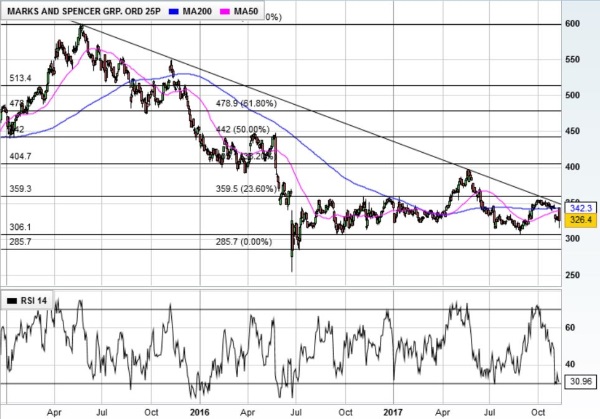Why M&S shares are still overvalued
8th November 2017 12:42
by Graeme Evans from interactive investor
Share on
For loyal and long-suffering investors, today's half-year results provided a very familiar soundtrack. Yes, another turnaround plan is underway, with the promise of sustainable, profitable growth and the pledge to make M&S "special again".
At least this latest restructuring effort is in the capable hands of new chairman Archie Norman, who has form in this area, having revived British retail brands Kingfisher and Asda.
Some of the initial work has already been undertaken by chief executive Steve Rowe, who has addressed "immediate and burning issues" such as too much discounting and poor stock availability and shopping experience.
Half-year profits of £219 million gave the Rowe/Norman partnership an early boost as this figure was much better than the consensus forecast of £201 million, albeit still down 5% on last year. That M&S shares are little changed on the day perhaps reflects Rowe's honesty in admitting there are still many structural issues to address.
These include the need to right-size the UK store estate, including closures, space reduction and relocations where stores are underperforming. The ultimate aim is to reshape the estate to focus on high volume locations with a conforming store size and fit-for-purpose back-of-house facilities.
But these are initiatives which need time to implement, something M&S doesn't have when the convenience food and clothing sectors are moving so quickly and new online players and discounters arrive all the time.

In her latest 'sell' note issued following these results, Investec Securities retail analyst Kate Calvert makes this point: "It is early days in Mr Rowe's five-year rejuvenation strategy, with the benefits back-ended.
"M&S is playing catch-up in a difficult mid-market position and pressures in food are unlikely to recede near-term. In our view, the shares are unlikely to perform until evidence of sustainable recovery is seen."
She has a price target of 295p and says a forward price/earnings (PE) multiple of 11.1 times and dividend yield of 5.7% were not compelling enough given near-term consumer spending uncertainty, market volatility and poor earnings visibility.
M&S concedes that competition is intense, but points out that the business retains very strong market positions in lingerie, schoolwear, denim and suits.
In food, the headwinds have intensified as supermarket rivals look for a bigger slice of the convenience market. Hard-pressed consumers are also more aware of value and careful about premium choices.
As a result, the chain is slowing its Simply Food opening programme to about 80 new stores in this financial year, compared with 90 previously forecast. Capital expenditure for the group will be no more than £350 million this year, against £400 million previously.
The strong performance of M&S's food halls has provided some comfort in recent years, but there are signs that this may no longer be the case. Like-for-like sales were down 0.1% in the second quarter, the same rate as in clothing and home.
A PE of 11 hardly seems stretched and that generous yield should lend a level of support. However, profit forecasts are for only modest growth over the next few years and there are clear risks around rising costs caused by Brexit and the weak pound.
News that finance director Helen Weir is off to pastures new is being taken as a negative, coming as it does after last month's departure of clothing & beauty director Jo Jenkins.
For many analysts, 300p appears to be the right price until that turnaround gains traction.
This article is for information and discussion purposes only and does not form a recommendation to invest or otherwise. The value of an investment may fall. The investments referred to in this article may not be suitable for all investors, and if in doubt, an investor should seek advice from a qualified investment adviser.